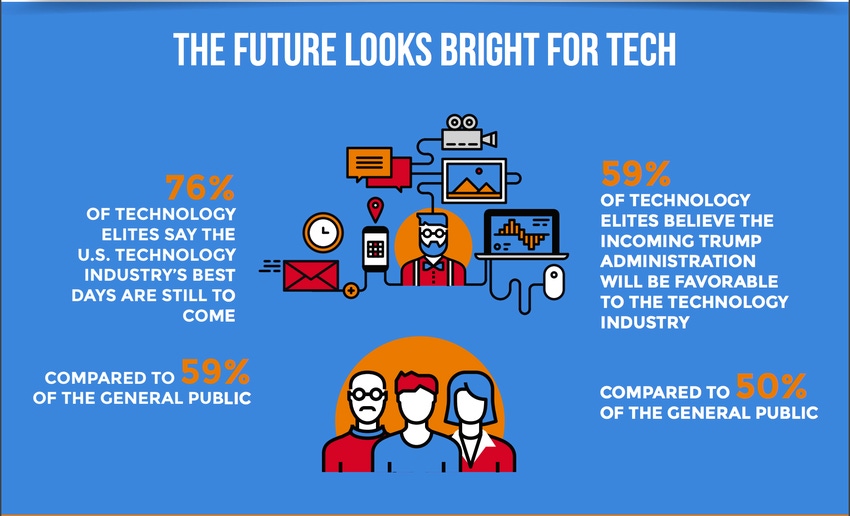Tech Industry More Optimistic About Trump Presidency Than Public
According to a recent survey, the technology sector is generally optimistic about President-elect Donald Trump's impact on the industry, but the general public has some concerns.
January 11, 2017

How will Donald Trump's presidency impact the US technology industry? According to a December 2016 survey of the general public and the technology industry, the general public doesn't share much of the same optimism as so-called “technology elites,” individuals who either work in technology or invest in the technology sector. The Burson-Marsteller Age of Trump Technology Policy Survey, which included 1,000 respondents from the US general public and 500 technology elites, found that 76% of technology elites say the best days of the US technology industry are still ahead, compared with 59% of the general public. Fifty-nine percent of technology elites also believe the Trump administration will be favorable to the technology industry, compared with 50% of the general public, as noted in the December survey.
|
According to The Burson-Marsteller Age of Trump Technology Policy Survey those that work in or invest in technology are more optimistic than the general public about Donald Trump's potential impact on the industry. (Image source: Burson-Marsteller) |
The results of the survey, which was conducted by research firm Penn Schoen Berland (PSB) on behalf of Burson-Marsteller, a global strategic communications and public relations firm, showed a pervasive sense of optimism among technology elites compared with the general public.
Seventy-three percent of technology elites believe the technology industry will contribute to job creation, compared to 63% of the general public. Seventy-three percent of technology elites also say that innovation is critical to America's position in the global economy and the technology industry is going in the right direction to maintain that, compared to 59% of the general public.
Yet while the majority of both the general public (66%) and technology elites (56%) believe the the technology industry will do better in the next four years, they were divided on how significant a role Trump would play in it. According to the survey results, “Only 50% of the general public say 'yes' when asked if Trump is a technology industry supporter, and this is only slightly higher among technology elites at 59%.”
Comparing the Obama administration to Trump's incoming administration, technology elites were split down the middle on whether Trump or Obama better understood the needs of technology companies. The general public favored Trump over Obama on this issue, with 58% in favor of the Trump administration.
|
Survey findings also show the general public is more likely than technology elites to agree that traditional manufacturing and service jobs are more important for the economy than expanding innovation (74% versus 68%). The general public is also more likely to say that technology is a “job destroyer” for the average American (37% compared with 27% of technology elites), according to the survey. Thirty-five percent of the general public respondents felt that innovation negatively affects jobs for the average American, compared with 22% of technology elites who said the same thing.
Donald Trump remained vague throughout his campaign on any specific policies that may impact the technology and manufacturing industries, but his election has created some big questions. Meanwhile,Trump's pledge for his first 100 days in office offers some insights that could have an impact on the technology industry:
Among his pledges, Trump has promised to “lift the restrictions on the production of $50 trillion dollars’ worth of job-producing American energy reserves, including shale, oil, natural gas, and clean coal,” as well as lift “ Obama-Clinton roadblocks” to allow projects like the Keystone Pipeline to move forward.
He has also promised to reallocate billions from climate change programs toward fixing America's water and environmental infrastructure. Trump also says he plans to withdraw from the Trans-Pacific Partnership and to renegotiate NAFTA or, failing that, withdraw from it entirely.
The President-elect has also proposed an End the Offshoring Act, which would establish tariffs to discourage companies from offshoring workers and shipping products manufactured internationally back into the US tax-free.
Other acts Trump has proposed include an expansion of military investment and an American Energy and Infrastructure Act, which he says will leverage “public-private partnerships, and private investments through tax incentives, to spur $1 trillion in infrastructure investment over 10 years.”
In early January, Ford Motor Co. announced that it had abandoned plans to build a $1.6 billion dollar plant in Mexico and instead would be investing $700 million into an existing plant in Flat Rock, Mich. and adding 700 jobs. Ford CEO Mark Fields told CNN this move is part of the company's new commitment to electric vehicles and in part as a “vote of confidence” for the “positive manufacturing business environment” Ford believes will grow under Trump. Critics of Ford's company line, however, have remained skeptical, citing economic forces already in place from the Obama and Bush administrations as the real drivers behind the decision.
According to the Burson-Marsteller survey, overall only 27% of the general public feels the country is going in the right direction, with 46% of general public respondents saying they believe the economy will improve under Trump. By contrast 59% of technology elites believe the economy will improve under Trump, with 52% of technology elite respondents believing the country is going in the right direction.
Forty-one percent of technology elites surveyed voted for Trump, while 47% of the general public did.
Burston-Marsteller has released two infographics around its survey – one on key findings; the other on demographic differences between technology elites and the general public.
Chris Wiltz is the Managing Editor of Design News
About the Author(s)
You May Also Like



.jpg?width=300&auto=webp&quality=80&disable=upscale)

